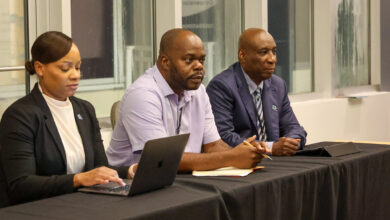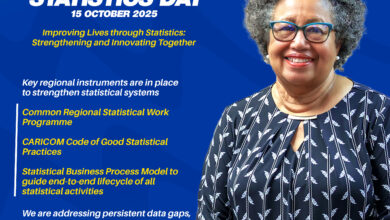Colleagues,
Like all previous meetings of CARICOM Stakeholders on Sugar, our Third Meeting comes at another critical juncture in the ongoing Sugar Reform process, that is, on the eve of an important meeting of the EU Agricultural Council scheduled to be held on 20-21 February 2006.
That meeting is likely to deliberate on the level of financial support that will be extended to ACP sugar supplying States for their Action Plans on Accompanying Measures.
As was the case with the level of price cut, we await this announcement with apprehension and a sense of great anxiety.
We have great confidence in our Ambassadors in Brussels and our representatives in London, who are no doubt hard at work leaving no stone unturned in the quest to ensure that the level of compensation is commensurate with the level of price cut and that it accords, as far as possible, with the figures reflected in the Action Plans of our respective Governments.
The political directorate based here in our Region will have to mount an all out lobbying mission together with other ACP countries to send a strong political message about the seriousness we attach to this matter.
Political back-up from the NGOs is indispensable if success is to be achieved.
In addition, we must urge our Heads of Government to implement a decision that was taken some time ago to mount a long overdue lobbying mission to Europe to express their concerns “face to face” with their European counterparts.
It is to be recalled that the CARICOM Heads of Government of the banana-exporting countries had mounted several lobbying missions to Europe to advance their economic interests. Thus far, no similar mission has been mounted by the Heads from the CARICOM sugar-exporting countries. It is a serious deficit that needs to be corrected since it is of great significance and should not be under-estimated.
This meeting must serve to remind Heads of their decision on this matter and to advise that the time is indeed propitious for a mission to be undertaken as soon as possible.
Colleagues,
This is our first Meeting of Stakeholders since the Tenth Meeting of ACP Sugar Ministers, held in Kisumu, Kenya and the Sixth ministerial Meeting of the WTO held in Hong King.
Also, it is our first Meeting since the announcement of the 36 percent cut in the price of sugar by the European Commission.
I wish to congratulate my Colleagues, the Ambassadors and Officials who actively participated in the Kisumu Meeting and made important contributions to the Declaration and Action Plan that emanated from that Meeting.
It is critical that, together with our Ambassadors in Brussels, we remain focused and engaged, notwithstanding the many obstacles that surface from time to time.
Colleagues,
One of the political objectives we sought to accomplish at Kisumu was to raise the political and diplomatic struggle to another level, having regard to the impending price cut and the level of compensation that was bandied about at that time.
It was generally agreed that we should point to the St. Kitts and Nevis experience to demonstrate what catastrophic consequences the Sugar Reform proposal would have for the ACP sugar-supplying States.
I am not convinced that we have succeeded in translating this political message effectively to the bureaucrats and politicians in Brussels.
On the contrary, we now seem to be caught up in the E.C’s rules of the game by dedicating our attention and energies to formulating our respective Action Plans on Accompanying Measures rather than paying primary attention to the political and diplomatic dimension of our campaign.
Our platform must be, as Glenys Kinnock put it: “Nothing is ever a done deal and if it is a bad deal then you don’t want it.”
Colleagues,
I ask you: How can a 36 percent price cut be a good deal? How can compensation to the tune of less than €500M be a good deal? If, as our Heads, in their statement issued at the Malta Commonwealth Heads of Government Meeting have stated:
‘… the decision breaches the very principle of partnership and introduces great uncertainty into the letter and spirit of the Sugar Protocol – a legally binding document “of indefinite duration” and specifically runs counter to the very commitment set out in Article 36 (4) of the Cotonou Agreement…’
Thus, clearly it behooves us to put to our Heads a clear and definitive proposal about mounting a legal challenge to the Reform Proposals. We look to our Legal Counsel to advice us to the best of his knowledge on this particular matter.
We have gone past the stage of exploring the possibility of a legal challenge. The time for action is now.
History, nay, future generations will never forgive us if we do not take legal action in one form or another to register and seek some redress for our legitimate rights.
Colleagues,
We must not forget our legitimate demand for the establishment of a “Compensation Fund”. Clearly, this demand has fallen on deaf ears in Europe and has been left to languish. We must not allow this to happen. On the contrary, we must find the rightful place for the Compensation Fund in the overall strategy for accessing compensation from the Commission.
In this regard, I would like to recommend that we consider requesting assistance from the CDB or UWI to draw up a comprehensive proposal on how this Fund is to be positioned within our demarche for compensation; how it is to be financed; and what will be the objectives and the criteria for accessing resources from the Fund.
In effect, the idea is to move from the notion of a Fund and to make it concrete and with numbers.
Colleagues,
As regards Sugar and the WTO, there remains outstanding a number of important matters which we, as stakeholders, must be concerned about. I refer to issues such as Long Standing Preferences and Preference Erosion; the Sugar Protocol and its compatibility with WTO Rules; the Ad Valorem Equivalent for Sugar; and the status of Small, Vulnerable Commodity-Dependent Economies within the WTO. In this regard, we welcome the statement by EU Trade Commissioner Peter Mandelson, who recently discussed differentiation among developing countries in the WTO, stating that:
“We have to break the politically correct fallacy that developing countries are all alike and have the same interests.”
We look to Mr. Mandelson to aggressively pursue this line of thinking with a view to translating this concept into a reality before the conclusion of the current negotiations.
We are prepared to lend whatever support that is required of us to back this demand.
Incidentally, it is important to note that at Hong Kong, Small Economies gained greater recognition. This is reflected in para. 24 of the Hong Kong Declaration treating with industrial goods, the Small Economies Reference in Services, Special Safeguard Measures and Sensitive Products and the invitation and participation of Small Vulnerable Economies (SVEs) in the meetings of developing countries now termed the G110, which includes the G-20, G-33, G-90 and SVEs.
The much anticipated establishment of the WTO’s Aid for Trade Task Force, whose task will be to negotiate with the International Financial Institutions (IFIs) compensation for losses as a result of preference erosion is a welcome development. We have a vested interest in ensuring that representation on this Task Force is to our satisfaction and reflective of our interests.
Colleagues,
On our Agenda is a highly important matter for consideration. I refer to the Thomas/Haraksingh Study on “Caribbean Options for the treatment of Sugar in the context of the Caribbean/EU/EPA Negotiations”.
It is to be noted that at Kisumu, Ministers reaffirmed that EPAs must be instruments to promote the sustainable development of ACP and LDC countries contributing to the eradication of poverty and facilitating the integration of ACP and LDC countries into the global economy.
To ensure that the Special Legal Status of the S.P. is reaffirmed and its integrity maintained and, finally, to ensure that the EU lives up to the guarantees contained in the Caribbean Agreement, particularly Article 36(4), to Safeguard the benefits derived from the Sugar Protocol.
These are the general principles by which we must be guided in our deliberations on this matter.
In this connection, it is apposite to note that, in their Declaration issued from Malta, CARICOM Heads noted the significance of the cut in the price of Sugar:
“This pattern of EU-Caribbean relationship does not augur well for future Trade Agreements…”
We must seek advice from CARICOM Heads as to whether, in light of this statement we should proceed with the EPA negotiations, having regard to past and the more recent experiences with the European Commission.
On another important matter, the EU has publicly declared its desire to encourage regional cooperation through EPAs. Thus it makes little or no sense to allow the benefits of the St Kitts and Nevis or any other quota shortfall within the Region to be eliminated from the Region.
This matter has been formally and officially raised at every conceivable forum within the ACP and the EC already has knowledge of CARICOM’s view on the matter.
The record of the Kisumu Ministerial Meeting, based on a recommendation made by CARICOM, reads:
“Noted the firm intention of CARICOM Sugar exporting countries to seek to retain the St. Kitts sugar quota within CARICOM when it becomes available for permanent re-allocation;
The paper presented for consideration on this matter will no doubt generate intense discussions but, at the end of the day, our objective and mandate are clear: that by “Hook or Crook,” any sugar protocol shortfall must remain within the Region.
Colleagues,
Over the past four weeks we have read a number of statements on sugar emanating from within our Region. Some of these Statements have been conflicting, confusing, controversial and unhelpful, but above all, some even run counter to the principles and objectives of the CSME.
Stakeholders’ Meetings of this nature are therefore timely and critical in bringing greater clarity and single-mindedness to our approach on issues pertaining to sugar in the Region.
I wish you every success in your deliberations.
Thank you.





